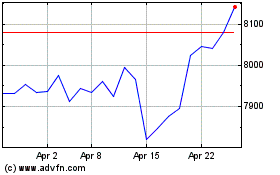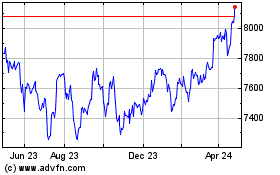LONDON MARKETS: FTSE 100 Slides By The Most In 10 Months As May Calls Early General Election
April 18 2017 - 12:54PM
Dow Jones News
By Carla Mozee, MarketWatch
U.K. stock benchmark posts biggest one-day loss since aftermath
of Brexit vote
U.K. stocks saw the biggest one-day slide in nearly 10 months on
Tuesday after Britain's Prime Minister Theresa May called an early
general election in a bid to strengthen the government's position
ahead of Brexit negotiations with the European Union.
The FTSE 100 stumbled 2.5% to close at 7,147.50, marking its
biggest single-session percentage drop since June 27 last year.
That was a couple of days after the U.K.'s vote to leave the
European Union.
Only 11 components were able to move higher, led by a 1.9% rise
for department store operator Marks & Spencer PLC
(MKS.LN)(MKS.LN). The midcap FTSE 250 index was also dragged lower,
ending down 1.2% at 19,297.91.
Investors returning from Monday's holiday in observance of
Easter had been dealing with a selloff in mining shares before news
emerged that Prime Minister May planned to make an unscheduled
statement.
Equity losses then accelerated as the pound surged after May
said she wanted an early general election to be held on June 8
(http://www.marketwatch.com/story/uk-leader-theresa-may-calls-snap-general-election-on-june-8-2017-04-18).
Blue-chip stocks tend to pull back when sterling strengthens as a
stronger pound can cut into earnings and sales made overseas by
London-listed multinationals.
May, leader of the ruling Conservative Party, said a snap
election is needed as other parties in parliament are opposed to
the government's Brexit plans. Conservatives holds a slim
parliamentary majority of 17 seats.
"While the timing might seem ill-judged, the reasons appear
twofold: Theresa May described this as a 'moment' in which the EU
is consolidating its negotiating position, hence a window of
opportunity before the start of more meaningful negotiations," said
Richard de Meo, managing director of Foenix Partners, in a
note.
"The prime minister feels the negotiation process with Europe is
likely to be increasingly frustrated by the conflicting political
agendas of domestic party politics. A general election will allow
the U.K. parties to lay out Brexit strategies and for the elected
party to then implement a much clearer path through EU
negotiations," said de Meo.
On Wednesday, May will ask for parliamentary approval for the
election.
Sterling hit an intraday high of $1.2774, the strongest level
since Dec. 6, according to FactSet data. The pound late Monday in
New York bought $1.2565.
"Arguably a stronger government might be able to get a better
deal for the U.K. and this could support sterling, but this is
likely to be at the margins," said Neil Wilson, senior market
analyst at ETX Capital, in a note.
"A stronger Tory majority government could push through a more
aggressive version of a hard Brexit that is negative for the
pound," he said.
Strategists at Deutsche Bank said Tuesday they were closing out
their bearish pound trades. "We intend to review our sterling
forecasts in coming days," they said.
Read: Why the snap U.K. election is a 'game-changer' for the
pound
(http://www.marketwatch.com/story/heres-why-the-pound-surged-to-10-week-high-after-may-called-snap-uk-election-2017-04-18)
Also: Risk of 'a reversal in the entire Brexit
process'--analysts react to U.K. election surprise
(http://www.marketwatch.com/story/uk-adds-another-layer-of-complexity-analysts-react-to-surprise-snap-election-call-2017-04-18)
Miners: On Tuesday, shares of iron ore and copper producer Anglo
American PLC (AAL.LN) dropped 5.1%. Shares of iron ore heavyweights
Rio Tinto PLC (RIO) (RIO) (RIO) and BHP Billiton PLC (BLT.LN)
(BHP.AU) (BHP.AU) slid 3.8% and 5.6%, respectively.
The moves in miners came as iron-ore prices slumped to
five-month lows and copper prices erased most of last week's
rebound, Accendo Markets said in a note early Tuesday.
Read: Iron-ore prices hit 5-month lows on China worries
(http://www.marketwatch.com/story/iron-ore-prices-drop-to-lowest-levels-since-november-2017-04-18)
"[I]nvestors believe major restocking from Chinese stimulus may
now be complete. Said price falls are clearly ignoring Chinese GDP
picking up from recent 6.7% lows to hit 6.9%--fastest since Q3
2015--albeit fueled by credit and infrastructure investment and a
relentlessly booming property market," wrote analysts Mike van
Dulken and Henry Croft of Accendo.
The basic materials group makes up about 8% of the FTSE 100's
weighting.
"That iron ore prices are descending further into bear market
territory is a particular worry for the FTSE 100. Commodity and
multinational companies have contributed some of the biggest gains
in the last 12 months," said Jasper Lawler, senior market analyst
at London Capital Group, in emailed comments.
Oil prices fell further as the session wore on, down about 0.8%.
Shares of oil producer BP PLC (BP.LN) (BP.LN) fell 3.9%, and rival
Royal Dutch Shell PLC (RDSB.LN) (RDSB.LN) lost 3.1%.
(END) Dow Jones Newswires
April 18, 2017 12:39 ET (16:39 GMT)
Copyright (c) 2017 Dow Jones & Company, Inc.
FTSE 100
Index Chart
From Mar 2024 to Apr 2024

FTSE 100
Index Chart
From Apr 2023 to Apr 2024
